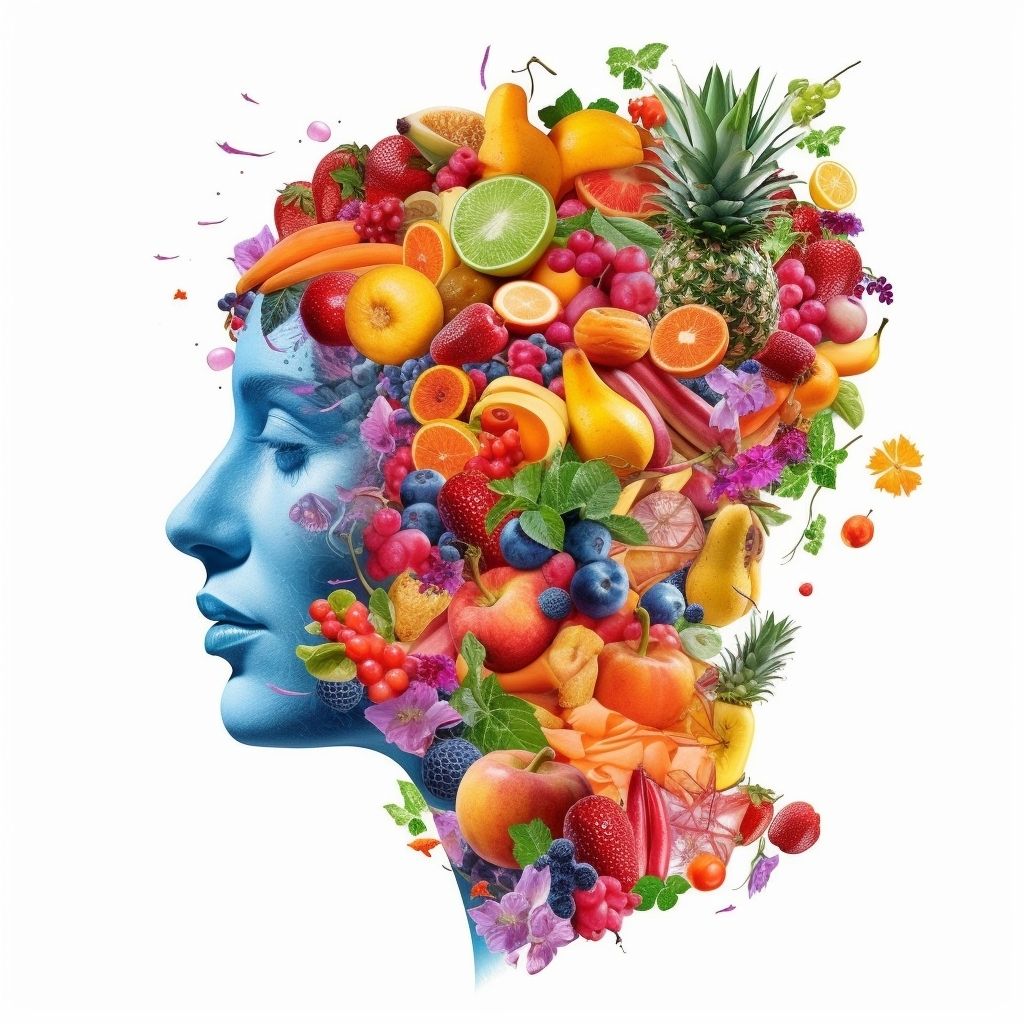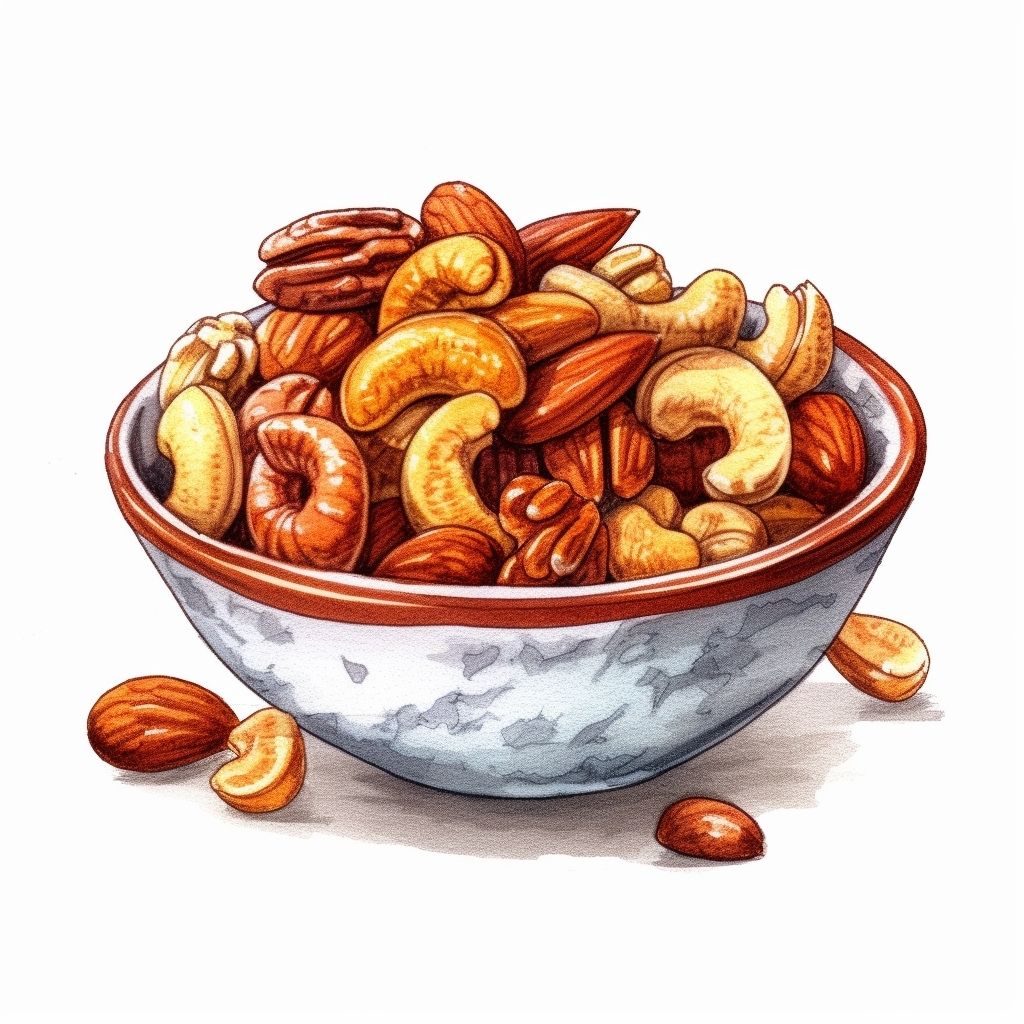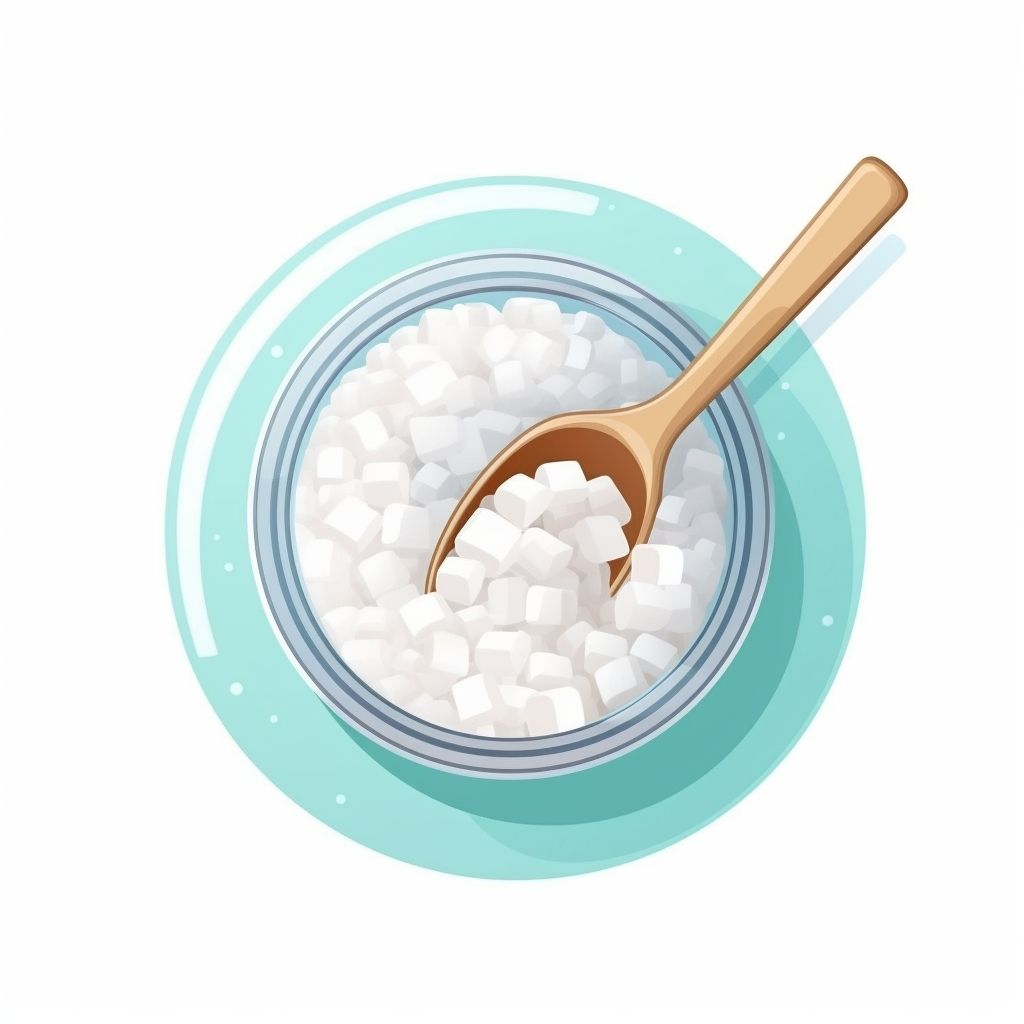Depression and Nutrition: Foods That Can Support Mental Well-being

Depression and nutrition! Are they related?
Research has increasingly shown a strong correlation between nutrition and mental well-being. The food we consume plays a vital role in the functioning of our brain and can significantly impact our mood and emotions. Nutrients such as omega-3 fatty acids, B vitamins, and amino acids are essential for neurotransmitter production and regulation, influencing our cognitive and emotional states. Studies like the one conducted by Parletta et al. (2017) found that individuals adhering to healthier dietary patterns experienced a reduced risk of developing depression.
A healthy diet has emerged as an essential factor in managing depression and its symptoms. Numerous studies, including the research by Jacka et al. (2017), have indicated that adopting a nutrient-rich diet, such as the Mediterranean or DASH diet, can lead to a reduction in depressive symptoms. Nutrient-dense foods not only provide the necessary building blocks for brain function but also support the body’s natural stress response, aiding in coping with emotional challenges. By prioritizing a balanced and wholesome diet, individuals can take significant steps towards improving their mental well-being and managing depression effectively.
Nutrition for Depression: Understanding the Connection
The impact of nutrients on brain function and mood regulation has gained significant attention in recent years. Essential nutrients play a crucial role in the synthesis and functioning of neurotransmitters, which are chemical messengers that facilitate communication between nerve cells in the brain. For instance, omega-3 fatty acids, found in fatty fish, flaxseeds, and walnuts, have been associated with improved mood and cognitive function. These fatty acids are vital for the structural integrity of brain cell membranes and the production of anti-inflammatory compounds that can help alleviate symptoms of depression.

Scientific Studies Linking Diet and Depression
Numerous scientific studies have explored the link between diet and depression. One noteworthy study conducted by Li et al. (2017) found that individuals adhering to a traditional dietary pattern, such as the Mediterranean diet, had a lower risk of developing depression compared to those with a Western diet rich in processed and sugary foods. Another research conducted by Lai et al. (2020) showed that a higher intake of fruits and vegetables, which are rich sources of antioxidants and phytochemicals, was associated with a reduced risk of depression.
Common Nutritional Deficiencies Associated with Depression
Certain nutritional deficiencies have been linked to an increased risk of depression. For example, inadequate intake of B vitamins, particularly folate (vitamin B9) and vitamin B12, can impair the synthesis of neurotransmitters like serotonin and dopamine, which are crucial for mood regulation. Similarly, low levels of vitamin D have been associated with a higher prevalence of depressive symptoms. Addressing these nutritional deficiencies through dietary changes or supplementation could potentially improve mood and mental well-being.
The Best Diet for Depression
Mediterranean Diet and Its Benefits for Mental Well-Being
The Mediterranean diet, inspired by the traditional dietary habits of Mediterranean countries, has garnered attention for its positive impact on mental well-being, particularly in relation to depression. This diet emphasizes the consumption of fruits, vegetables, whole grains, nuts, seeds, and healthy fats, primarily derived from olive oil. These nutrient-rich foods provide essential vitamins, minerals, and antioxidants that support brain health and reduce inflammation. A study by Sánchez-Villegas et al. (2015) found that adherence to the Mediterranean diet was associated with a lower risk of depression in a cohort of participants.

DASH Diet: Reducing Depression Through Healthy Eating

The Dietary Approaches to Stop Hypertension (DASH) diet, primarily known for its cardiovascular benefits, also shows promise in reducing the risk of depression. The DASH diet emphasizes the consumption of fruits, vegetables, whole grains, lean proteins, and low-fat dairy products while limiting sodium and added sugars. A study by Cherian et al. (2019) demonstrated that participants following the DASH diet experienced a significant decrease in depressive symptoms over a period of time.
Plant-Based Diets and Their Impact on Mood and Depression
Plant-based diets, which focus on plant-derived foods and minimize or exclude animal products, have been associated with improved mood and reduced risk of depression. Plant-based diets are typically rich in fruits, vegetables, legumes, nuts, and seeds, providing a wide array of nutrients that promote brain health. A study published in the Nutritional Neuroscience journal by Beezhold et al. (2018) highlighted that individuals adhering to a vegetarian or vegan diet reported lower levels of depression and anxiety compared to those consuming omnivorous diets.

Crafting a Depression Diet Plan
Crafting a depression diet plan that incorporates mood-supporting foods while avoiding or limiting detrimental ones can contribute to improved mental well-being and help in managing depression effectively.
Foods to Include for Mood Support
Omega-3 Fatty Acids and their Role in Brain Health:

Omega-3 fatty acids, particularly EPA (eicosapentaenoic acid) and DHA (docosahexaenoic acid), are essential for brain health and function. They play a crucial role in the structure of cell membranes in the brain and are involved in neurotransmitter synthesis and signaling. Research has shown that a higher intake of omega-3 fatty acids is associated with a reduced risk of depression. Fatty fish, such as salmon, mackerel, and sardines, are excellent sources of EPA and DHA. A systematic review by Grosso et al. (2014) highlighted the potential benefits of omega-3 supplementation in improving depressive symptoms.
Serotonin-Boosting Foods: Tryptophan Sources:
Serotonin is a neurotransmitter that contributes to feelings of happiness and well-being. Tryptophan is an essential amino acid that serves as a precursor to serotonin. Including foods rich in tryptophan in the diet can support serotonin production. Some tryptophan sources include turkey, chicken, tofu, nuts, seeds, and dairy products. A study by Markus et al. (2008) demonstrated that a tryptophan-rich diet was associated with improved mood and reduced anxiety.

Foods Rich in B-Vitamins and their Influence on Mood:

B vitamins, such as folate (vitamin B9), vitamin B12, and vitamin B6, play a vital role in mood regulation and mental well-being. They are involved in the synthesis of neurotransmitters, including serotonin and dopamine. Leafy green vegetables, legumes, whole grains, and fortified cereals are excellent sources of B vitamins. A randomized controlled trial by Almeida et al. (2008) found that supplementation with B vitamins significantly reduced depressive symptoms in older adults.
Foods to Avoid or Limit for Depression Management
The Impact of Sugar and Refined Carbohydrates:
High intake of sugar and refined carbohydrates can lead to rapid fluctuations in blood sugar levels, impacting mood and energy levels. Research by Knüppel et al. (2017) revealed that a diet high in sugary foods and refined carbohydrates was associated with an increased risk of depression in men.

Trans Fats and their Connection to Depression:

Trans fats, commonly found in processed and fried foods, have been linked to inflammation and an increased risk of depression. A prospective study by Lucas et al. (2011) reported that individuals consuming higher amounts of trans fats were more likely to develop depression.
Caffeine and Alcohol: Moderation is Key:
While moderate caffeine intake may have some benefits, excessive consumption can lead to sleep disturbances and worsen anxiety. Similarly, excessive alcohol consumption is associated with an increased risk of depression. A study by Boden et al. (2013) found a significant association between alcohol use disorders and subsequent depression.

Depression Diet and Exercise: Synergistic Effects
By integrating regular physical activity into a depression management plan alongside a nutritious diet, individuals can experience synergistic effects that contribute to improved mental well-being and a more balanced, healthier lifestyle.
The Role of Physical Activity in Reducing Depression Symptoms

Physical activity has been recognized as a valuable adjunct to conventional treatments for depression. Engaging in regular exercise promotes the release of endorphins, which are natural mood elevators. It also reduces levels of stress hormones, such as cortisol, leading to a reduction in feelings of anxiety and depression. Research conducted by Schuch et al. (2018) indicated that physical activity, whether it be aerobic exercises or strength training, can significantly decrease depressive symptoms and improve overall mental well-being.
How Exercise Complements a Healthy Diet for Better Mental Health
When combined with a healthy diet, exercise can have a powerful impact on mental health. A nutritious diet provides essential nutrients that support brain function and neurotransmitter production, while exercise enhances blood flow to the brain and fosters neuroplasticity, the brain’s ability to adapt and rewire. Studies, such as the one by Deslandes et al. (2009), have demonstrated that individuals who engage in regular exercise while maintaining a balanced diet experience greater improvements in depressive symptoms compared to those who only focus on one aspect.

Tips for Incorporating Exercise into a Depression Management Plan
- Start Slow: Begin with gentle exercises like walking or yoga and gradually increase intensity as you build confidence and stamina.
- Find Activities You Enjoy: Choose physical activities that bring you joy and make it easier to stick with the routine.
- Set Realistic Goals: Set achievable exercise goals to avoid feelings of frustration and self-criticism.
- Establish a Routine: Incorporate exercise into your daily or weekly schedule to create a sense of structure and consistency.
- Seek Support: Consider exercising with a friend or joining group classes to enhance motivation and accountability.

A 7-Day Meal Plan for Depression
| Day | Breakfast | Lunch | Dinner | Snacks |
| Monday | Greek Yogurt Parfait with Berries and Nuts | Quinoa Salad with Chickpeas and Veggies | Baked Salmon with Roasted Vegetables | Sliced Apples with Almond Butter |
| Tuesday | Spinach and Mushroom Omelette | Grilled Chicken Wrap with Whole Wheat Tortilla | Stuffed Bell Peppers with Brown Rice | Carrot Sticks with Hummus |
| Wednesday | Smoothie with Spinach, Banana, and Chia Seeds | Lentil Soup with Mixed Greens | Grilled Tofu with Steamed Broccoli | Trail Mix with Nuts and Dried Fruits |
| Thursday | Oatmeal with Almonds, Berries, and Cinnamon | Turkey and Avocado Sandwich on Whole Grain Bread | Quinoa and Veggie Stir-Fry | Greek Yogurt with Honey and Berries |
| Friday | Whole Grain Pancakes with Maple Syrup | Chickpea and Vegetable Curry with Brown Rice | Baked Chicken with Sweet Potato Mash | Cucumber Slices with Cottage Cheese |
| Saturday | Scrambled Eggs with Spinach and Feta Cheese | Quinoa Salad with Grilled Shrimp | Baked Cod with Asparagus and Lemon | Sliced Peaches with Cottage Cheese |
| Sunday | Acai Bowl with Granola and Fresh Fruits | Grilled Vegetable Wrap with Hummus | Spaghetti Squash with Tomato Sauce | Dark Chocolate with Mixed Nuts |
Note: This meal plan aims to provide a variety of nutrient-dense foods rich in omega-3 fatty acids, B vitamins, tryptophan, and other essential nutrients that can support mental well-being. It includes a balance of lean proteins, whole grains, fruits, vegetables, and healthy fats to promote a healthy body and mind. Please make sure to personalize the meal plan according to individual dietary preferences, restrictions, and nutritional needs. Consulting with a healthcare professional or a registered dietitian is recommended before making significant changes to one’s diet, especially for managing depression.
Healthy Eating and Depression: Long-term Lifestyle Changes

Maintaining a depression diet plan can be challenging, especially during times of stress or low motivation. It is crucial to identify potential obstacles and develop strategies to overcome them. Setting realistic and achievable goals, meal planning, and creating a supportive environment can make it easier to adhere to a healthy eating regimen. A study by Silveira et al. (2018) emphasized the significance of social support and self-monitoring in sustaining positive dietary changes for managing depression.
The Importance of Consistency and Patience in Seeing Results:
Achieving the full benefits of a depression diet plan requires consistency and patience. While some individuals may experience immediate improvements, others may require more time to notice changes in their mental well-being. It is essential to be patient with the process and not get discouraged by setbacks. A randomized controlled trial by Opie et al. (2015) indicated that adherence to a Mediterranean-style diet for at least three months led to significant reductions in depressive symptoms.
HealWiser’s Last Piece of Advice
Emerging evidence suggests that diet can be a valuable complementary approach to conventional treatments for depression. While not a substitute for professional medical advice, a well-designed depression diet plan can enhance the effectiveness of therapy and medication. By harnessing the power of nutrition, individuals can take an active role in their mental health, fostering positive long-term outcomes.
Share your experience with Healwiser and others in the comments section below this post.





